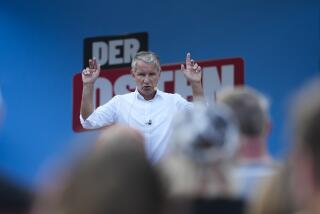Ex-SS Officer Fans German Nationalism
AUGSBURG, Germany — They gathered at a sports hall in this tidy corner of Germany--ordinary citizens, waiting for their leader’s word to revive their spirits.
They weren’t disappointed.
At 70, Franz Schoenhuber may be past his prime, but the former Waffen SS sergeant basked in the moment that seemed as important for him as for the faithful of the right-wing Republikaner Party he has led for the last eight years.
For the better part of an hour Saturday, he played to the fears, frustrations and anger that bubble inside his followers.
It was the keynote speech at the party’s annual convention, and he said things no mainstream German politician would ever say, but which a growing number of Germans have begun to feel.
“We respect foreigners, we want them to be treated well, . . . but we don’t want to feel like strangers in our own country,” he said, assuring them--in case any confusion arose--that he rejects the ideas of dual citizenship and voting rights for foreigners.
The applause was loud and punctuated with the German equivalents of “Right on!”
He told the expectant faces before him that Germany’s terrible fate this century was the fault of outsiders. It was Versailles, the harsh treaty after World War I, that lay at the heart of German misery, while Germany’s post-World War II division was the result of American failure to stand up to Soviet dictator Josef Stalin.
He portrayed the political Establishment in Bonn as a group of liars and incompetents consistently shamed by outsiders into betraying the nation.
He delivered a withering attack on President Richard von Weizsaecker, the only German political figure to speak out forcefully and consistently against the wave of xenophobic attacks.
“We’re not ashamed of being German, but we’re ashamed to be represented by you,” he shouted.
The comment was a show-stopper, replete with a standing ovation and yelps of approval.
Two compelling facts add to the relevance of Schoenhuber’s performance:
* Those clapping were not the skinheads or directionless young people whose attacks against foreigners have generated alarm and confusion at home and widespread condemnation abroad.
They were orderly, mainly middle- and lower-middle-class people, angry about the influx of outsiders, frustrated by the failure of political leadership to stop it and fearful of what it, and a sharp economic downturn, mean for them and their families.
* Their numbers are growing.
The Republikaners hope to elect extreme rightist representatives to the federal Parliament next year for the first time since 1945, and opinion polls show the chances of that are increasing.
There are no great people of power here--no movers or shakers. These are the moved and the shaken.
Some were reluctant to give their names, but all expressed a type of nationalism that boiled down to “Germany for the Germans.”
“This is the only party that really stands for Germany,” said Khrista Elbern, a Berlin police officer, who said her personal experience had led her to conclude that foreigners commit the majority of crimes in the country.
Ulrich Voigt, an unemployed eastern German, complained about the country’s contributions to the European Community.
In part, those present at Augsburg symbolize a larger minority of Germans who increasingly see the attacks on foreigners as distasteful but regrettable necessities to stem the flow in the absence of political leadership.
While none said they would participate in violence or even openly advocate it, their attitude contributes to an overall impression of a tacit approval.
Fearful of driving voters into the Republikaner camp, many members of Chancellor Helmut Kohl’s center-right Christian Democrats have done little to counter this impression of approval.
In the wake of last November’s arson attack that killed three Turkish nationals in the northern town of Moelln, the community’s mayor, Joachim Doerfler, said the mood in the community was such that he wondered whether a local youth arrested (and now on trial) for murder really believed he was doing something that would meet with disapproval.
Schoenhuber places the blame for this and other social ills squarely on Bonn.
“The Republikaner and their chairman, Franz Schoenhuber, are Germany’s salvation,” he thundered. “Germany is not lost. . . .”
The applause rolled up again.
More to Read
Sign up for Essential California
The most important California stories and recommendations in your inbox every morning.
You may occasionally receive promotional content from the Los Angeles Times.










